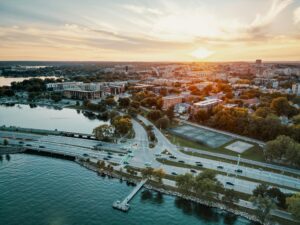
Gentrification is not just about new buildings and rising rents, it is about people, histories, and communities. Across the country, including here in Dane County, urban renewal has reshaped historically Black neighborhoods, affecting families and forcing long-standing residents to relocate. While investment in infrastructure and businesses can have benefits, it often comes at the cost of erasing the deep cultural roots that Black communities have built over generations. As we honor Black History Month, it is essential to recognize how gentrification impacts Black families, particularly in housing, economic opportunity, and community stability.
The Changing Landscape of Dane County
Over the past few decades, Madison and surrounding areas have seen significant population growth and economic expansion. As property values and rent prices increase, historically Black neighborhoods experience shifts that make it harder for families to remain in their homes. A 2021 study from the Wisconsin Policy Forum found that while homeownership is a key factor in housing stability, Black homeownership rates in Dane County remain disproportionately low compared to white households, largely due to systemic barriers in lending, generational wealth, and economic access.
While Black families have contributed to Madison’s rich culture and economy for generations, they are often the first to feel the pressures of development. These shifts are about more than economics; they affect a sense of belonging, community ties, and the ability to build a future in the places that have long been home.
The Intersection of Economic Stability and Housing
Housing and economic stability go hand in hand. Madison is home to a diverse and skilled workforce, yet systemic barriers persist in wages, employment opportunities, and access to generational wealth-building. While Madison’s job market is growing, racial disparities in employment and income remain. The Madison Economic Development Report notes that Black workers experience higher unemployment rates (8.2%) compared to white workers (2.9%), a gap that reflects historical exclusion, hiring biases, and inequities in access to higher-wage industries.
Many Black workers in Dane County hold essential roles in healthcare, education, transportation, and service industries—roles that keep the city functioning. Yet, these same workers often face rising rents and housing costs that outpace wage growth, making it more difficult to maintain stable housing. A just and equitable city is one where all residents, regardless of job sector, have access to affordable and stable homes near their places of work and community.
Preserving Cultural and Historical Spaces
Gentrification affects more than housing, it changes the spaces that give communities their sense of home. Churches, barber shops, family-owned restaurants, and community centers have long been gathering places where Black families build networks of support. As redevelopment accelerates, these places often struggle to remain, leaving neighborhoods with fewer culturally affirming spaces.
The South Madison neighborhood, historically a hub for Black culture and entrepreneurship, has undergone significant changes in recent years. Black-owned businesses that have served the community for decades now face rising commercial rents and shifting demographics. While city initiatives like the South Madison Plan seek to address these challenges, the ongoing loss of these spaces signals the need for more intentional preservation efforts.
Centering Community Voices: What Can Be Done?
While gentrification is a structural issue, it does not have to be inevitable. Centering the voices of Black residents and ensuring that growth benefits everyone, not just newcomers, can create more equitable solutions. Here are some steps that can help:
- Expanding Affordable Housing Options – Ensuring long-term affordability through rent stabilization policies and increased investment in public housing initiatives.
- Strengthening Tenant Protections – Advocating for eviction prevention programs, rental assistance, and fair housing enforcement.
- Investing in Black-Owned Businesses – Providing grants, financial resources, and policy protections that allow Black entrepreneurs to remain in their communities.
- Workforce Equity Programs – Supporting job training, wage equity policies, and hiring practices that ensure Black residents have access to stable, high-paying jobs.
Get Involved
We know that housing is more than just shelter; it is the foundation for stability, opportunity, and belonging. This Black History Month, we encourage our community to engage in conversations about gentrification and support policies and initiatives that prioritize housing justice.
If you’re interested in learning more, here are some resources to explore:
